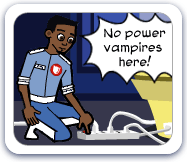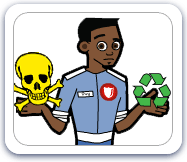Shortcuts:.
Environmental Issues | Being Green | Reducing Waste
Being green is about making smart, responsible choices to help make your world a better place. Every choice you make towards being green benefits both you and the planet.
Computers and Electricity Usage

Creating electricity takes a lot of resources, and it costs you money to use it, so it makes sense to try and reduce how much you use. One easy way to do so is to turn off your computer and peripherals when you're not using them.
Use a surge protector with a power switch then you can use it to switch off a group of devices at the same time. This can also help you be more energy-efficient by preventing "vampire power," which is power that devices use even when they are turned off. Devices on standby use 10% of the energy in an average house!
Software programs like Local Cooling can calculate how much electricity your computer uses and adjust the settings of your power options to help minimize it. Physical devices like the EarthWatts Power Supply can help increase the efficiency of your computer's power supply and keep the computer cooler, so the fan doesn't have to work as hard.
Buying Green

One way to be more green is to choose more energy efficient and environmentally friendly options when buying a computer and accessories. This is good for you because it saves you money, and it’s good for the environment because it uses up less resources.
- Laptop computers use 75% less power than desktop machines.
- Monitors account for about half of the energy used by a computer, and the larger the monitor, the more power it uses.
- LCD, or liquid crystal display monitors (the newer, flat monitors) use only about 10-20% as much energy as CRT, or cathode ray tube monitors (the big box-shaped older monitors), and they cost less.
- Ink jet printers use about 90% less energy than laser jet printers and you can hardly tell the difference in print quality with some of the newer models.
If you're looking to buy a more energy efficient computer or monitor, look for one with an Energy Star rating. Any product that earns the Energy Star label uses 30 to 75% less electricity than a standard product. If Americans only purchased Energy Star computers, we would save almost $2 billion in energy costs each year and prevent the same amount of pollution as about 2 million cars.To be even more green, look for machines that contain fewer toxic substances, produce less heat, and are made with non-toxic recyclable plastics.
Watch Out For Greenwashing

Greenwashing is when companies claim their products are environmentally safe to get people to buy them, even if they really aren't. The term comes from the words "green," meaning environmentally friendly, and "whitewashing," which means twisting words to cover up a mistake or an unwanted result.
Greenwashing is usually a marketing move to get people who are interested in protecting the planet to purchase a product they normally wouldn’t consider. Companies trick a customer into thinking that they are doing something because they want to help the environment, like using less packaging, when really they are doing so because it will save them money. While it is better for the environment, that’s not their main motivation.
Electronics companies guilty of greenwashing might sell energy-efficient electronics that contain hazardous materials. Sure, they use less energy, but if someone wanted to buy a truly environmentally friendly product, they're not getting one.
The best way to avoid companies that greenwash is to do your homework. Find out as much as you can about how things are made and what toxic chemicals are bad for your health, so you know what to watch out for. The National Library of Medicine's ToxTown site has lots of good information on the potentially dangerous chemicals in your environment.
But since most companies don't tell you the whole story, sometimes you have to dig to find out how environmentally friendly their company really is. Websites like GreenwashingIndex.com and StopGreenwash.org serve as resource centers for concerned consumers like you to share information. Just like Internet scams, greenwashing companies usually sound too good to be true, and they usually are.
Environmental Issues | Being Green | Reducing Waste

